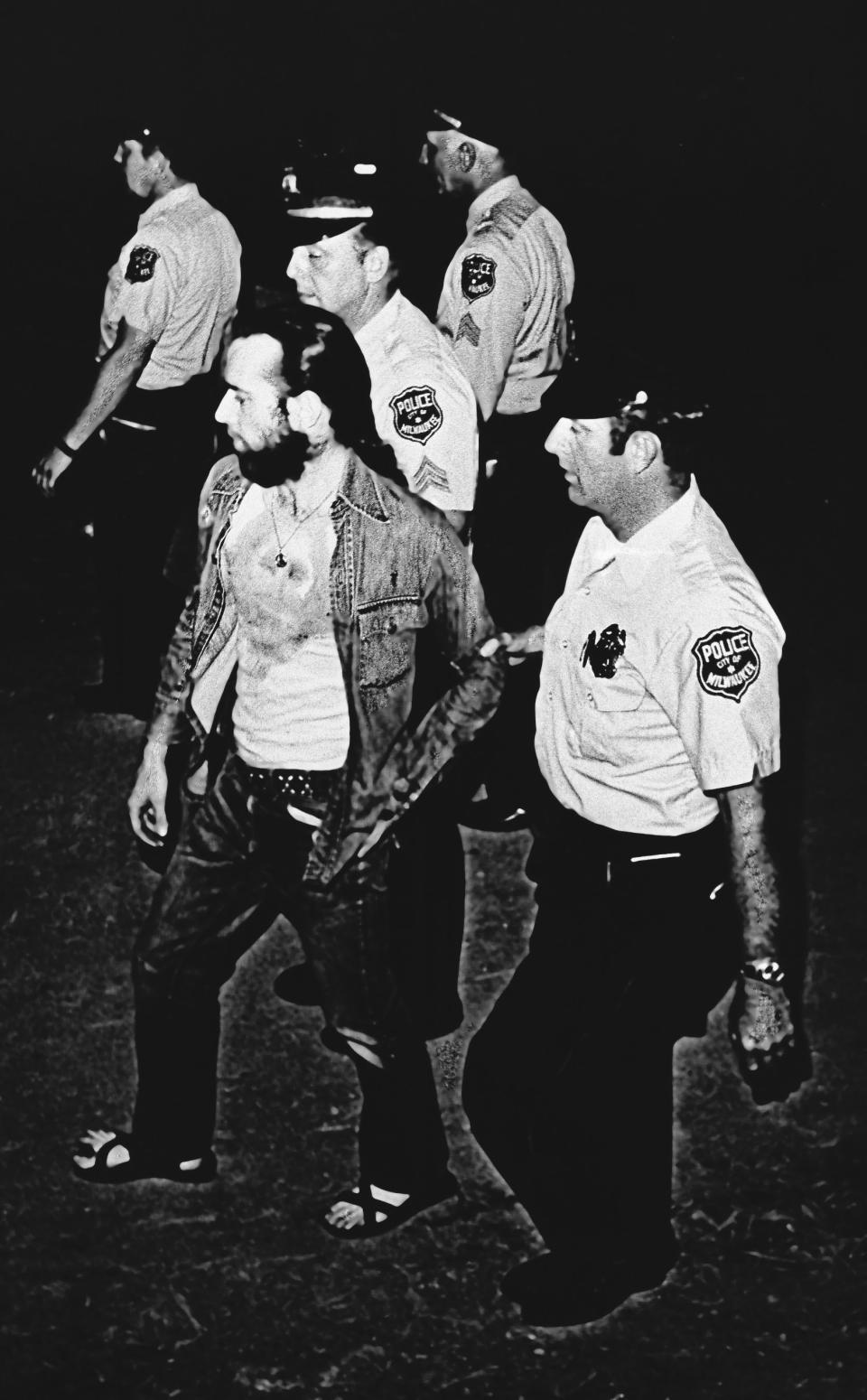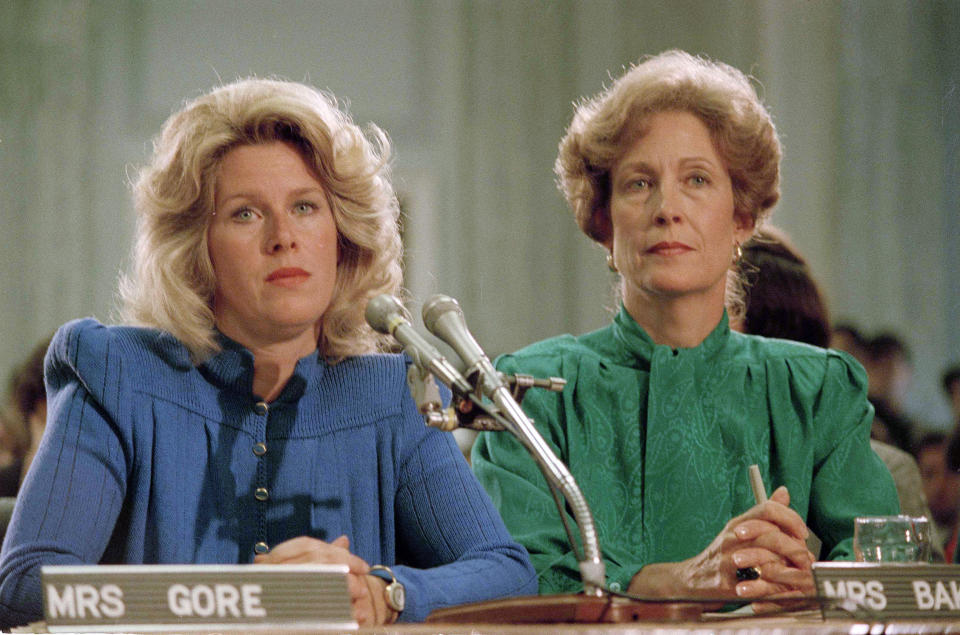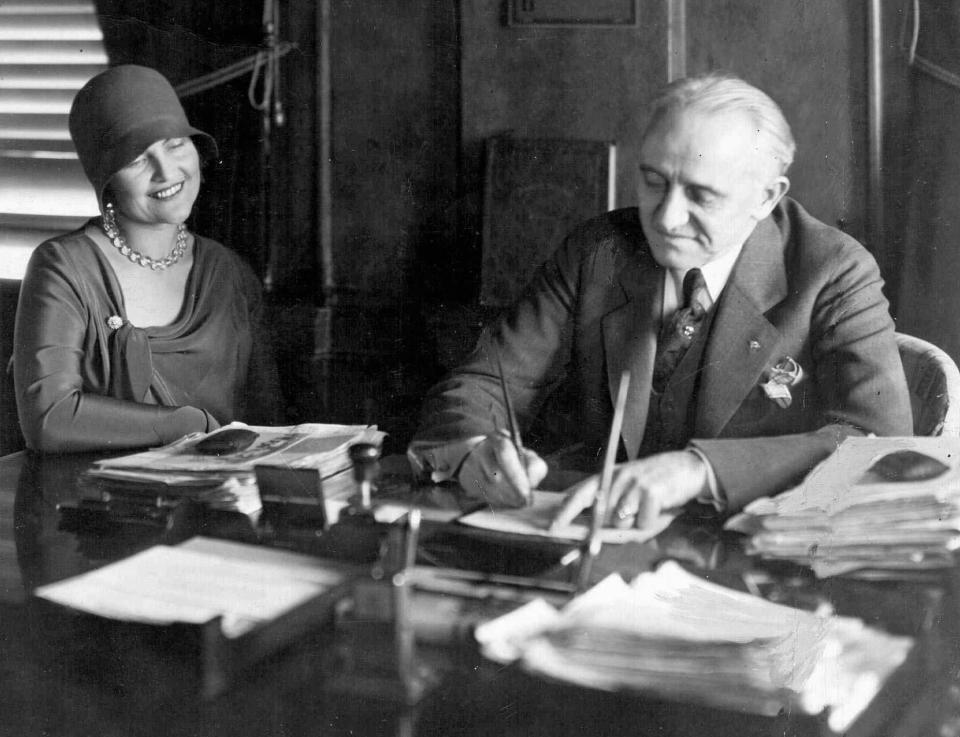Free flow of racy content a headache for parents
Until this summer, few people outside the R&B music scene knew who Robin Thicke was. Then came his new song "Blurred Lines" and an unrated online video to promote it.
"You the hottest b---- in this place!" Thicke sings, as topless models playfully dance around him.
The video has stirred a debate, with detractors complaining that it's too racy and degrading to women.
Thicke insists he meant no offense — and the song, meanwhile, has become the No. 1 hit of the summer.
Certainly in pop culture, pushing the limits of what's considered appropriate is hardly new. Back in the roaring 1920s, young women of the "flapper" generation raised eyebrows. In the 1950s, Elvis gyrated and caused a ruckus.
In the 1970s, comedian George Carlin joked about "The Seven Words You Can Never Say on Television," quickly listing them in a social commentary about the pitfalls of censorship.
Singling out those few words seems almost quaint in an era when just about any kind of uncensored content is easily accessible from a mobile phone, a tablet, or on less regulated cable and Internet TV or satellite radio. Media experts say broadcast TV and mainstream radio have, in turn, tried to keep up by airing saucier content to try to retain dwindling audiences. Many see this free flow of content as progress — a victory for freedom of expression in an uptight society.
But for many parents, it also can be difficult to try to keep their kids from pop culture offerings they don't consider age appropriate.
Do they filter it as best they can? Laugh it off? Use it as a teachable moment? Demand more limits?
And if they do the latter, who gets to decide what those limits are, anyway — since what's appropriate to one person might not be to another?
"It's a conundrum," says Kirsten Bischoff, a mom in Springfield, N.J., who's also co-founder of HatchedIt.com, an online social network for families
Bischoff recalls wincing during a car ride last year as her then 13-year-old daughter and a young friend belted out the song "Whistle" by rapper Flo Rida. The girls had no idea the song was about fellatio.
Mom decided to say nothing so they wouldn't ask questions. But she later fretted about her decision on her online blog, where other parents told her they'd faced similar dilemmas.
"Lord, I'm turning into Tipper Gore," Bischoff later joked, fearing people would compare her to the former second lady, who campaigned to get the music industry to put warning labels on content with explicit lyrics.
Gore got some support but became the object of ridicule and a few protest songs, including rapper Ice T's 1989 song "Freedom of Speech" in which he, too, used the b-word to refer to Gore and other profanities to make his point.
It's true that those who question any kind of content risk being called a prude, or a censor. That's partly because history has shown that efforts to curb allegedly "indecent" content can fail, or look misguided in hindsight, says Susan Mackey-Kallis, an associate professor of communication at Villanova University.
In 1930, Hollywood adopted the Motion Picture Production Code, a list of moral standards for the film industry.
Among other things, the code — which was abandoned in the 1960s for the current rating system — forbade showing interracial sexual relationships, scenes of childbirth, "in fact or in silhouette," or anything about sexual hygiene or sexually transmitted diseases. It also was implied that gay content should not be shown.
"Looking at a list like this today, it is amazing to think how far we have come," Mackey-Kallis says.
While religious or political figures have often weighed in with moral arguments, today a decision to limit content is as likely to be a business decision.
Credit card companies and the banks that oversee their transactions use web-crawling and other investigative techniques to search for questionable content. They do not, for instance, allow payments for goods or services that are related to any illegal sexual acts — or that might even depict rape or exploitation of a minor. But beyond clearly illegal acts, they also reserve the right to steer clear of any content they feel reflects poorly on their brands.
Ultimately, however, it is the courts that determine what is obscene, a term reserved in the legal system for sexually explicit content that meets certain criteria.
The U.S. Supreme Court has based its definition of obscenity on "community standards" and these three factors:
- Does the work appeal to "prurient," or excessively sexual, interests?
- Does it "depict or describe, in a patently offensive way, sexual conduct specifically defined by the applicable state law?"
- And does the work lack "serious literary, artistic, political or scientific value?"
"It's clearly very tough to prove. What's obscene to some may be artful dancing to others," says Robert Pondillo, a professor of mass media history and American culture at Middle Tennessee State University who wrote the book "America's First Network TV Censor."
And, he notes, the courts have not tended to limit language, which generally falls under free speech protection. Media that is broadcast on the airwaves — network television and radio, for instance — is still somewhat limited, though not as much as some parents would like.
Determining what's acceptable is further complicated by the fact that online life has changed the notion of the "community standard."
"We're an increasingly connected society, so we're no longer divided by our (physical) communities," says David Gudelunas, a communication professor at Fairfield University in Connecticut.
Now, those communities are often online, stretching across continents and age brackets to bring together people with common interests.
Take 33-year-old Ben Tao. He was an engineering student in Los Angeles when he discovered a "niche" in the adult film industry. Crowdfunding sites such as Kickstarter, he learned, didn't allow the creators of sexually oriented projects to post those projects to seek funding.
So he started Offbeatr, a fundraising site for creators of adult films and content.
His site is aimed at people age 18 and older. Those who propose projects for funding must prove their age, though he concedes it's impossible to monitor the age of everyone who visits the site.
Of course, parents can use filters to keep their children from the content, he says.
But he concedes, "I think it's a hard battle to fight if you're trying to say, 'I'm going to protect against every single thing.'"
Therein is the dilemma. Should society err on the side of free access, even if it means children might encounter inappropriate content? Or do you set limits on online access to pornography, for instance, unless a household requests that access, as British Prime Minister David Cameron plans to do?
Should radio stations err on the side of a playing "clean" versions of songs? Should cable companies be more careful about airing age appropriate content during daytime hours?
And for that matter, should an artist such as Nicki Minaj worry if an 8-year-old learns the words to a song that talks about selling cocaine and "panties comin' off"? A couple years ago, the parents of Sophia Grace Brownlee, a young British girl, made a video of her rapping and singing Minaj's song "Super Bass."
Deemed "cute" and "adorable" by the video's many viewers on YouTube, Sophia Grace later performed the song on Ellen DeGeneres' talk show, where she has since become a regular.
Minaj herself seemed a tad uncomfortable when she appeared on the show with Sophia Grace and urged the girl to sing a tamer part of the song.
But Jeffrey McCall, a media studies professor at DePauw University in Indiana, says he's not surprised that few others questioned whether a kid this age should perform the song, or even have access to it.
"The entertainment industry has a huge role in deciding what is culturally OK, and society will often take (its) lead," says McCall, author of the book "Viewer Discretion Advised: Taking Control of Mass Media Influence."
Even Pat Cooper, a comedian who knew George Carlin, sees a difference between the late comic's "Seven Words" skit and much of the material he hears today.
Carlin "was saying, 'Let's express ourselves. Be a human being,'" says Cooper, who's 85 and lives in New York City. Too often now, Cooper says, vulgarity on stage and elsewhere is used for shock value alone.
"We don't want to think anymore. So instead of thinking we just curse out what we want to say," Cooper says.
Jeanne Achille, who heads a New Jersey public relations firm, cites a recent story as another example of this problem: the media's summer obsession with New York politician Anthony Weiner and his habit of sending lewd photos of himself to women.
"Sadly," she says, the coverage "validates ... our society's tolerance for ingesting everything and anything with no sense of what to filter and no ability to put boundaries in place — whether sensationalistic news delivered 24/7, huge quantities of bad food also available 24/7, or horrible television programs featuring stupid, foul-mouthed people."
But she's found her way to deal with it and suggests others do the same.
"Not to sound like Nancy Reagan, but, 'Just say no.,'" Achille says. "I'm at a point in life where I've finally learned that I can shut it out and don't need to participate when it doesn't suit me."
For an individual decision, that can work fine. But, again, what about when it comes to raising a teen today?
Bischoff, the mom in New Jersey, feels powerless to filter out all the inappropriate content.
"There's no way to shelter a kid anymore, unless we home-school her and go live in the woods somewhere," she says. "The only thing I can think of to do as a mom is to try to stay ahead of it . with talk, talk and more talk."
____
Martha Irvine is an AP national writer. She can be reached at mirvine@ap.org or at http://twitter.com/irvineap






